The City of London Green City Briefings
The City of London Green City Briefings are a forum to learn and discuss the worldwide adoption of living green in cities as a result of compelling evidence of the benefits for city resilience and citizen health and wellbeing. The Briefings are a series of 8 one-hour webinars that present compelling evidence and examples of the power of ‘living green’ in delivering multiple solutions to city challenges. These briefings aim to provide the latest evidence for the benefits of plants in creating liveable, resilient cities and present practical examples of how these benefits are realised.

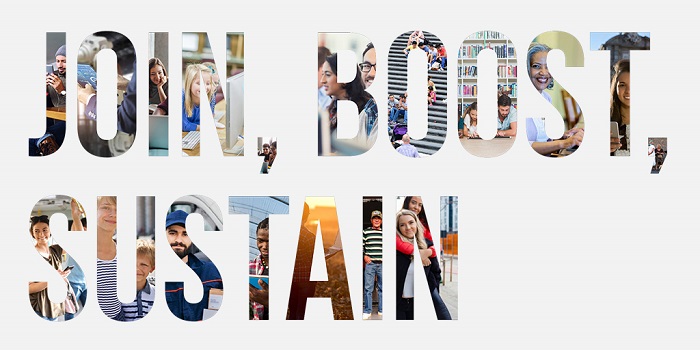
The living-in.eu platform was launched during the CITYxCITY Festival and
creates the conditions to upscale digital solutions based on iconic projects. Living-in.eu is
a bottom-up movement which has the ambition to have a positive impact on the quality
of life of at least 300 million European citizens by 2025. The initiative is a cooperation of
Eurocities, Open & Agile Smart Cities (OASC), European Network of Living Labs (ENoLL)
and is supported by the European Commission and the European Committee of the
Regions. The platform will enable Cities & Regions to work together on societal
challenges with the help of digital solutions. Through iconic projects, such as Urban
Digital Twins, the Citizen Card and Urban Data Platforms, cities & regions are able to
develop and implement the solution on a local level.
A new guide published by the International Union for Conservation of Nature (IUCN), in collaboration with the International Olympic Committee (IOC) and the San Francisco Estuary Institute (SFEI), identifies key ecological criteria that city officials and sports venue developers can apply to incorporate the needs of nature in their planning.
Organization(s):
Abstract:
Investing in nature and nature-based solutions is an important pathway to address the current ecological crisis. The loss of biodiversity, with around one million animal and plant species threatened with extinction, is putting at risk our economies, livelihoods, food security, health, and quality of life worldwide. Diverse and innovative measures are needed to reverse this decline and to restore healthy ecosystems. The magnitude of the challenge calls for the collaboration and contribution of all actors, including non-state actors, such as businesses, local authorities, civil society organisations, and individual citizens. Sports and urban biodiversity identifies the opportunities for sports federations and sport venue owners and operators to develop the seven elements essential for supporting nature in cities. Case studies from Europe, North America, Australia and South Africa capture the biodiversity actions taken by a variety of sports, from Olympic city planning to local projects at stadiums and practice facilities. These examples also reveal ways in which improvements to urban biodiversity elements can offer a better sporting experience for event participants and spectators.
As we celebrate World Environment Day, many of us isolated at home, the COVID-19 pandemic provides a sobering opportunity to reflect on our relationship with nature.
Nature provides us with essential life-supporting services such as food, clean water, medication and habitats. Healthy and diverse ecosystems contribute to making our communities more resilient. Countless studies have also demonstrated that interacting with nature positively impacts our mental and physical health and well-being, helping to alleviate stress and anxiety, especially prevalent at this time.
Yet, according to the Intergovernmental Science-Policy Platform on Biodiversity and Ecosystem Services (IPBES), biodiversity continues to decline in every region of the world, significantly reducing nature’s capacity to contribute to people’s well-being. This alarming trend endangers economies, livelihoods, food security, and quality of life of people everywhere. And our troubled relationship with nature makes us more vulnerable to hazards, such as extreme climate events and pandemics.
It is time to reimagine humanity’s relationship with nature.
Governments around the world, citizens from all walks of life, economists, scientists, we all need to rethink how we can do things differently. The current pandemic, sadly, provides us with an opportunity to do so.
As for cities, we are already in this mindset and on this path. We redesign streets to facilitate active transportation and reduce our carbon footprint. We rethink the use of public space, to make it more enjoyable, accessible to all, and functional. We bring nature back into our rapidly urbanizing world, by creating parks and involving citizens in the protection of wildlife, such as creating corridors for the migration of the amazing monarch butterfly across North America.
By planning our cities with nature, we can improve quality of life now and lay the ground for a sustainable future for the next generations.
We are not only dreaming the city of tomorrow – we are building it now, integrating nature-based solutions in our development approach.
As we grapple with massive challenges, let us not return to business as usual.
Together, let’s take strong action to create vibrant and equitable communities, where people and biodiversity can thrive, in urban areas as well as around the world.
Let’s rally for the planet and for ourselves, by living in harmony with nature
Valérie Plante
Mayor of Montréal
ICLEI’s Global Ambassador for Local Biodiversity
Ashok Sridharan
Mayor of Bonn
President of Local Governments for Sustainability (ICLEI)
Michael Müller
Governing Mayor of Berlin
President of the World Association of the Major Metropolises (Metropolis)
Park Won Soon
Mayor of Seoul
Co-President of the Global Social Economy Forum (GSEF)
Mohamed Boudra
Mayor of Al Hoceima
President of United Cities and Local Governments (UCLG)
Oscar Rodriguez
Mayor of Asuncion
President of Mercociudades
On the occasion of International Day for Biodiversity on 22 May, Valérie Plante, Mayor of Montreal and ICLEI Global Ambassador for Local Biodiversity, penned a compelling letter, calling on mayors and leaders of local and subnational governments from around the world to jointly take urgent action to halt and reverse the trends of biodiversity loss. She points out that the COVID-19 pandemic provides a sobering opportunity to reflect on our relationship with nature.
In the letter, Mayor Plante also draws attention to the unique opportunity to act in the coming year, firstly in developing COVID response plans, and secondly as the local and subnational government constituency prepares for the 15th Conference of the Parties (COP) of the UN Convention on Biological Diversity (CBD). It is at COP 15 where the Parties will adopt the Post-2020 Global Biodiversity Framework (GBF), and it is critical that local and subnational governments are positioned as central to its implementation.
Local and subnational governments around the world are making ambitious commitments to conserve, restore, and live in harmony with nature in the coming decade. As a proud pioneer of the CitiesWithNature partnership initiative, Montreal is among over 150 front running cities and regions who are raising their ambition in support of the Post-2020 GBF. However, these ambitious commitments need to be met with the same level of action when it comes to implementation. Furthermore, this action needs to be captured as collective contributions to achieving the global biodiversity agenda.
On the occasion of World Environment Day, Montreal leads by example once again and demonstrates how their biodiversity actions are linked to the action targets in the CBD’s Zero Draft of the Post-2020 GBF.
“By planning our cities with nature – through nature-based solutions, green infrastructure and green open spaces – we can dramatically improve the quality of life for all. We need to halt and reverse the trends of biodiversity loss and take the path of Living in Harmony with Nature. On this World Environment Day, I call upon cities all over the world to become CitiesWithNature and to share their good practices, as Montreal is doing, to create a dynamic community of practice! Let’s take strong action to create vibrant cities and ensure a healthy planet, where people and biodiversity can thrive.”
~ Valérie Plante, Mayor of Montreal and ICLEI Global Ambassador for Local Biodiversity

The six good practice sheets below, compiled by Montreal, each present a key initiative of interest for the protection of biodiversity that is being implemented by the city, provide advice to facilitate the replication of the initiatives in other cities, and indicate which of the Post-2020 global biodiversity targets the initiative contributes to achieving. The sheets are a source of inspiration that showcase local and subnational leadership in the global biodiversity arena.
The launch of this initiative by Montreal, with support from the ICLEI Cities Biodiversity Center, the CitiesWithNature partnership initiative, and the Secretariat to the CBD, is timely. It stands as a further demonstration of the critical role of local and subnational governments in the CBD, and offers a blueprint for other cities and regions to demonstrate how they are achieving their biodiversity commitments. No action is too small. Instead, collective local action is our best chance at achieving global impact. Montreal is calling on other cities to join the journey to create vibrant cities, where people and biodiversity can thrive. Mayor Plante and the City of Montreal encourage other cities to develop similar resources that demonstrate their commitments in action, as well as the linkages between their local initiatives and global biodiversity targets.
As momentum builds towards COP 15, we need to think globally, and act locally! Global biodiversity targets need to be translated to the urban context to ensure that urban dwellers can enjoy the benefits of nature in their lives. Turning commitments into concrete action is critical now, more than ever before. Montreal’s initiative is an invitation to join a community of practice of local and subnational governments who stand ready to implement the Post-2020 GBF.
You can access the good practice sheets below:
Sheet 1: Ecosystem Management
The Ecosystems Management Program in Montreal’s major parks, preserves an essential balance between the protection of environmental integrity and general public access to sites, so that citizens can continue to enjoy the physical and psychological health benefits of nature. Inventories of the flora and fauna are maintained in order to paint a portrait of the major parks’ ecosystems. Through data collection and database management, the City monitors changes within habitats in order to intervene appropriately. When planning the development of a recreational space, such as a trail, the ecosystems portrait allows informed decision-making. Various management actions are carried out in response to the inventories, such as the removal of invasive alien plants and the subsequent planting of native vegetation.

This initiative contributes to the 2030 Action Targets of the Zero Draft of the Post-2020 Global Biodiversity Framework, particularly:
- target 2, concerning the protection of biodiversity through a network of protected areas
- target 3, concerning the control of invasive alien species
- target 6, concerning climate change mitigation and adaptation
- target 10, concerning increased public access to green spaces and ecosystem services
- target 13, concerning the integration of biodiversity protection into planning processes
- target 18, concerning the availability of reliable and up-to-date information for effective management
- target 20, concerning the promotion of sustainable behaviours
Sheet 2: Conservation of Wildlife Trees
The holes, decomposing wood, and bare branches of Montreal’s trees, both dead and alive, serve as roosts and shelters, as well as feeding and reproduction sites, for a wide range of biodiversity. Woodpeckers, owls and other birds of prey are wildlife trees’ main occupants, but squirrels, raccoons and voles are also found there. In its nature parks, the City preserves wildlife trees and keeps parts of their main branches safely in place. This ensures that the trees can provide this supporting service for wildlife for 20-30 years before decomposing and returning to the earth. The City aims to densify the number of wildlife trees per hectare to support nesting birds and vary the species, sizes, diameters and stages of decay of these trees to promote biodiversity.

This initiative contributes to the 2030 Action Targets of the Zero Draft of the Post-2020 Global Biodiversity Framework, particularly:
- target 2, concerning the protection of biodiversity through a network of protected areas
- target 6, concerning climate change mitigation and adaptation
- target 10, concerning increased public access to green and blue spaces and ecosystem services
- target 13, concerning the integration of biodiversity protection into planning processes
- target 18, concerning the availability of information
Sheet 3: Coexisting with Coyotes
Coyotes are very discreet and seek to avoid human confrontation. However, the expansion of coyote territory has resulted in an increased presence of the native species in North American urban areas. In 2017, coyotes were observed in Montreal’s neighbourhoods, causing some concern among residents. To ensure that humans live in harmony with nature in Montreal, a joint action committee was quickly established and a coyote management plan was created. Based on best practices and leading-edge scientific knowledge, its goal is to promote safe coexistence with the coyote. Communication is central to the plan, as well as scientific data collection to better understand the coyote’s behaviours and movements.

This initiative contributes to the 2030 Action Targets of the Zero Draft of the Post-2020 Global Biodiversity Framework, particularly:
- target 7, concerning the sustainable management of species and the reduction of human-wildlife conflict
- target 13, concerning the integration of biodiversity protection into planning processes
- target 18, concerning the availability of reliable and up-to-date information for effective management
- target 20, concerning the promotion of sustainable behaviours
Sheet 4: Environmental Action Days
The City of Montreal hosts environmental action days in their major parks. These days are designed to engage citizens through concrete action and collective effort. Citizens who take part in these days have an opportunity to contribute directly to the protection of ecosystems in their major parks, while acquiring new knowledge. Mentored by City of Montreal experts, the participants – volunteers of all ages – contribute to picking up garbage left behind, controlling invasive plant species and planting native vegetation, based on the day’s objective.

This initiative contributes to the 2030 Action Targets of the Zero Draft of the Post-2020 Global Biodiversity Framework, particularly:
- target 2, concerning the protection of biodiversity through a network of protected areas
- target 3, concerning the control of invasive alien species
- target 4, concerning pollution reduction
- target 10, concerning increased public access to green and blue spaces and ecosystem services
- target 20, concerning the promotion of sustainable behaviours
Sheet 5: Renewed and Improved Wildlife Observatories
Montreal has been redeveloping wildlife observatories in its nature parks in the past few years. Promoting collaboration among experts to design facilities that embody principles of sustainable design and construction, while respecting wildlife and environmental imperatives, these facilities allow citizens to observe the surrounding wildlife without disturbing it, thanks to a wall equipped with viewing slots arranged at varying heights to accommodate visitors of all ages and physical conditions. The redevelopment of these observatories also provides opportunities to plant native vegetation and improve the biodiversity of the surrounding area.

This initiative contributes to the 2030 Action Targets of the Zero Draft of the Post-2020 Global Biodiversity Framework, particularly:
- target 2, concerning the protection of biodiversity through a network of protected areas
- target 3, concerning the control of invasive alien species
- target 10, concerning increased public access to green spaces and ecosystem services
- target 13, concerning the integration of biodiversity protection into planning processes
- target 17, concerning the promotion of sustainable behaviours
Sheet 6: Wildlife Passages in the Urban Environment
Montreal has created a wildlife passage under a Boulevard that is currently being extended through a green corridor to restore habitat quality and enhance connectivity. The Boulevard has, over the past few years been under construction and now runs through a portion of the city’s eastern green belt. This corridor houses significant natural environments including a wooded border and wetlands. The wildlife passage is a 26-metre-long, culvert-type, two-level wildlife passage that was created under the boulevard as part of the construction process. A raised walkway allows species the choice of staying out of the water. Furthermore, approximately 600 native shrubs have been planted to block the incursion of reeds and enhance the area’s biodiversity. Through infrared camera technologies, Montreal has demonstrated the use of the culvert and its surrounding vegetation by a range of species, including the long-tailed weasel and the eastern milk snake.

This initiative contributes to the 2030 Action Targets of the Zero Draft of the Post-2020 Global Biodiversity Framework, particularly:
- target 1, concerning land management to promote connectivity and environmental integrity
- target 3, concerning the control of invasive alien species
- target 13, concerning the integration of biodiversity protection into planning processes
- target 18, concerning the availability of reliable and up-to-date information for effective management
By Timothy Blatch, CitiesWithNature Program Coordinator
Locations: Los Angeles, Montreal, Melbourne, London, and Durban
Los Angeles
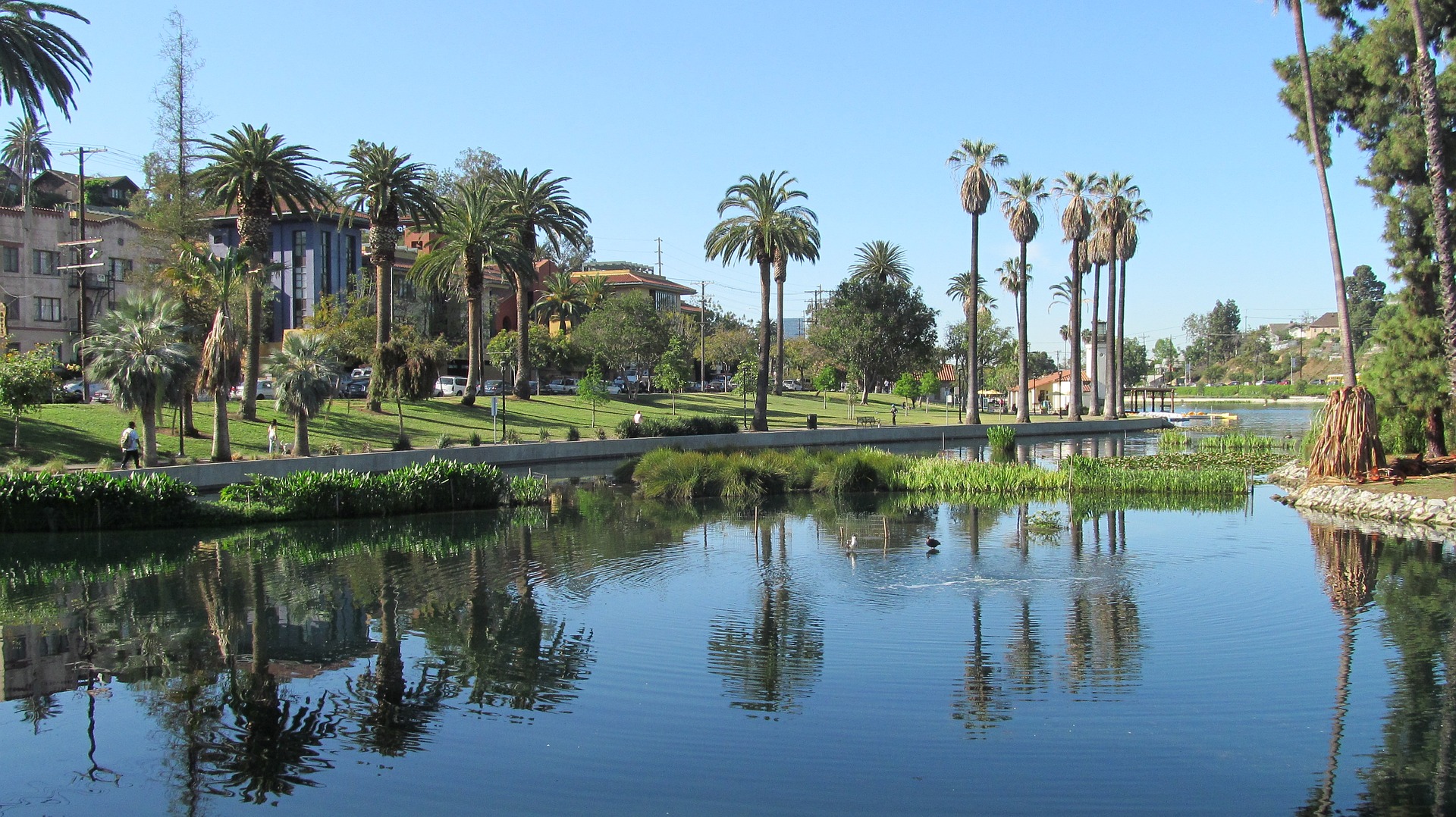
Melbourne

In the time of COVID-19, cities are on the frontlines of response efforts. While the pandemic has shone a spotlight on our healthcare systems and our socio-economic disparities, it has also brought our relationship with nature to the fore. The links between ecosystem stability, the natural environment, and human health have never been clearer. According to UNEPP (2020), it is precisely because of the interconnected nature of all life on this planet, that an ambitious post-2020 biodiversity framework matters greatly, and why nature needs to take center stage in our efforts to “build back better” in the coming days.
Inger Anderson, Chief of UN Environment put it well when she said, “Humanity’s expansion on the terrestrial earth surface means that, today, human activity has altered almost 75 per cent of the earth’s surface, squeezing wildlife and nature into an ever-smaller corner of the planet. And yet, nature is critical to our own survival: nature provides us with our oxygen, regulates our weather patterns, pollinates our crops and produces our food, feed and fibre, but it is under increasing stress.”
Anderson goes on to say that “we need to take on board the environmental signals and what they mean for our future and wellbeing, because COVID-19 is by no means a ‘silver lining’ for the environment. Visible, positive impacts are but temporary, because they come on the back of tragic economic slowdown and human distress.” In her First Person Editorial Ms. Andersen calls instead for a profound, systemic shift to a more sustainable economy that works for both people and the planet.
Montreal
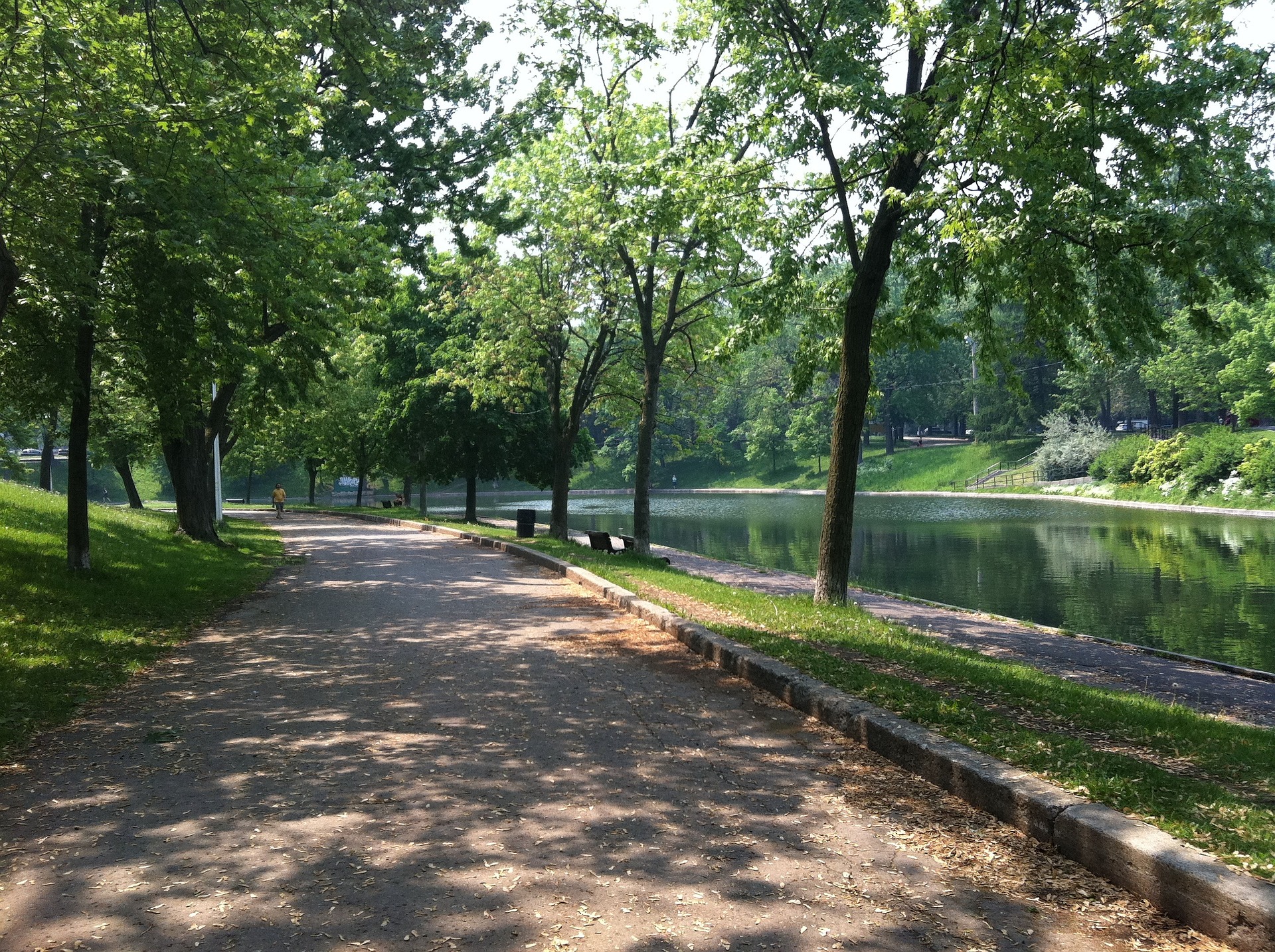
London

As almost half of humankind have lesser or even no options to connect with nature in these trying times, many are realising anew just how essential our connection with nature is for own health and wellbeing, and how we long for it once we are separated from it. We all need nature, even more so in these unprecedented times where the fast-changing daily dynamics of COVID-19 are consuming and fundamentally altering our lives.
“Urban parks and green open spaces provide opportunities for urban communities to enjoy and connect with nature, improving health and wellbeing. While we cannot all access our parks right now, we know that nature never closes and its multiple gifts continue to benefit our cities. Together we stand in solidarity with our cities to celebrate the value of nature and our urban parks, as we build resilient CitiesWithNature” – Kobie Brand, Global Director, ICLEI Cities Biodiversity Center
During the COVID-19 pandemic, cities are increasingly realising that:
Building urban resilience is critical
The COVID-19 pandemic is placing huge strain on our communities, our governments, our healthcare systems and our economies. Our cities still continue to grapple with massive sustainability challenges, and building resilience will be even more critical now and as we move forward during and after the COVID-19 pandemic.
We need to protect and respect nature:
Nature provides diverse life-supporting and life-enhancing contributions to people. All cities critically depend on healthy interconnected ecosystems within and around them. There is a growing urgency for collective and large-scale action to protect biodiversity and respect nature in and around cities to prevent irreversible loss and damage to the natural systems that protect us.
Nature is good for everyone:
It is well known that spending time outdoors in nature can be good for mental and physical health and wellbeing. Levels of stress and anxiety have increased dramatically since the outbreak of the COVID-19 virus, so any activity that offers stress reduction and improved health is a gift. If people don’t have symptoms and cities aren’t in total lockdown, spending time in nature, where people maintain adequate physical distance, can be very beneficial.
We increasingly need to connect online:
The pandemic is calling us to increasingly connect online. CitiesWithNature, as a unique, next-generation initiative, is supporting an online community of practice, enabling learning and action around integrating nature in cities and (re)connecting people with nature. CitiesWithNature:
- Demonstrates innovative ways of engaging cities and regions, partners and individuals on urban nature
- Provides a platform for knowledge sharing and learning on the critical importance of nature in urban life
- Offers a space for collective action at the local level to realise global impact
- Invites partners to come on board and shape the initiative going forward e.g. the development of a pathway on the critical importance of urban parks
- Grows and strengthens a virtual community of practice that is resilient to crises and is not dependent on physical space or in-person interaction
- Facilitates mainstreaming of nature in and around our cities to secure our increasingly urban future
Join the journey today and be a part of this exciting global movement in pursuit of building CitiesWithNature, which is especially critical both during and after the pandemic.

World Urban Parks and ICLEI: Partnering for Parks and CitiesWithNature
Urban parks are of critical importance for the health and wellbeing of urban communities and for the resilience of our urban areas, which is especially apparent now, more than ever before. It is, however, essential that these benefits are distributed equitable across our cities and that access to urban parks and green open spaces is ensured in as far as possible. Online, virtual, and more sustainable engagement mechanisms are key to a new way of doing in 2020 and beyond.
World Urban Parks and ICLEI- Local Governments for Sustainability, through its Cities Biodiversity Center, are thrilled to announce our exciting, new partnership. The signing of our collaboration agreement formalizes a strong partnership between World Urban Parks and ICLEI for collaboration on the CitiesWithNature Partnership Initiative and the WUP Campaign. Leveraging the individual and collective strengths of our organizations, our joint work programme will help to mainstream, protect, and enhance nature and maximize the benefit derived from the ecosystem services and nature-based solutions. This partnership is timeous, given the current circumstances surrounding the pandemic and the need for us to fundamentally rethink our relationship with the natural world.
“The overall aim of this partnership is to reconnect communities with nature in and around urban areas and use the CitiesWithNature platform to facilitate this aim, for the benefit of all partners of the Partnership Initiative. This partnership brings together two strong global organizations committed to advancing the protection and advancement of nature in urban environments for the health and well-being of all people and our planet” – Jayne Miller, Chair of World Urban Parks
Both our organisations look forward to working together to advance our joint vision for greener, healthier CitiesWithNature.
The COVID-19 International Parks Expert Roundtable Statement
On April 2nd, the World Urban Parks with its key global partners, including ICLEI’s Cities Biodiversity Center, held the first COVID19 International Parks Expert Panel to discuss how to further collaborate both during and after this global crisis on the importance of urban parks for people in our rapidly changing world.
From the statement of collaboration, there is overwhelming endorsement that parks are a critical public health and social resource and we recognize that stay-at-home measures and physical distancing will likely take a toll on our mental health, especially during high-stress and anxiety-producing global public health emergencies. We also know from medical research how important nature is in urban life and how access to parks and open space provides that “nature fix” for human survival – providing opportunities for physical activity and regaining our emotional, psychological and mental balance.
The world has changed substantially and the COVID-19 crisis needs a response that is far from business as usual. The COVID-19 International Parks Expert Panel of core members have agreed to work together, leveraging our individual and collective strengths, through leadership and collaboration, the co-creation of a clear vision, knowledge sharing and communication of clear, positive, time-sensitive messaging.
#NatureNeverCloses
ICLEI Cities Biodiversity Center was also a core partner in the World Urban Parks Park Week campaign: #NatureNeverCloses that ran from April 25th– May 3rd 2020.
With COVID-19 is affecting each country, region and city differently. For World Parks Week 2020, World Urban Parks, ICLEI Cities Biodiversity Center, and partners challenged all urban citizens to explore how and in what ways they are experiencing nature in their own circumstances. For example, some cities have completely closed off access to urban parks and green open spaces at this time. In some cities, residents are not allowed to leave their homes except for essential grocery store and pharmacy visits. However, some cities have allowed limited access to parks and green spaces and some have even kept their parks wide open to the public, with differing degrees of social distancing regulations. Even at this time, there are ways we can experience nature in our daily lives. This may take the form of birdwatching from the window or looking after the house plants. The pandemic has shown us that even when we seem to be locked down, nature never closes.
World Parks Week 2020 was an opportunity for us to share how and in what ways we are exploring nature!
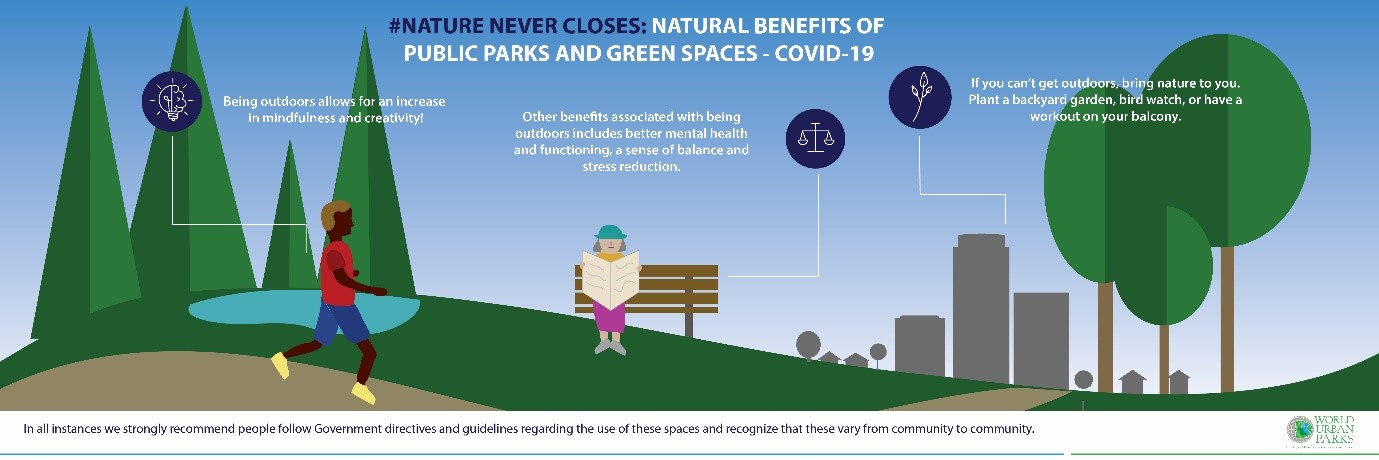
Source: World Urban Parks
During Parks Week, ICLEI CBC hosted a CitiesWithNature webinar on The Benefits of Access to Nature for Urban Communities During and Beyond Pandemics and Associated Movement Restrictions. The webinar brought together a panel of five city officials from major cities across the globe to share their experiences and learnings from the pandemic and to showcase how more than ever before, we need nature in and around our cities. The list of cities represented included Los Angeles, London, Melbourne, Durban, and Montreal.
“Life is all about connections, dynamics, and relationships. In cities, parks are essential places of contact with nature’s biodiversity. Parks are also places where people like to gather. Social distancing in parks is understandably a big and complex change that sparks important discussions. And while we navigate through restrictions in this sensitive context, we can bring to light the positive message that important well-being and health benefits can still be experienced, through immersion in nature, contemplation, and inspiration, which may be optimal when visiting a park alone. Discovering the unnoticed ‘nearby nature’ in smaller neighbourhood green areas can also bring positive and unsuspected discoveries for families, close to home. For so many reasons, biodiversity protection in cities is vital.” – Joëlle Roy LeFrançois: Planning Advisor, Urban Biodiversity Division, Parks and biodiversity management Department, Ville de Montreal
“This pandemic has reminded us that the available open space in an urban setting is inadequate, especially in our disadvantaged communities and also indicated how important these recreational areas are for our physical and mental health. We need to investigate the open space access indicator from not only the native wildlife standpoint, but also from the environmental justice perspective. Another valuable and obvious lesson that we learned is how clean the air and water have become while the world shelters in place. Many wildlife sightings in our open space (national parks) and urban environment reflects our adverse impacts on native faunas and that more access for all to open spaces and parks will have unintended consequence of adversely impacting native fauna.” – Mas Dojiri: Assistant General Manager at LA Sanitation & Environment (LASAN) and LASAN’s Chief Scientist, Los Angeles
Mr Errol Douwes: Senior Manager: Restoration Ecology Branch, Environmental Planning and Climate Protection Department, EThekwini Municipality (City of Durban) presented a collection of images of the nature in and around the City of Durban, in South Africa. Noting that South Africa’s response to COVID-19 has, to date, come with strict movement restrictions and citizens not being able to access green spaces or parks, Errol’s photo montage was a stark reminder of how beautiful nature is and how we long for it, especially when we cannot access it. Errol’s key message was that “globally, we need to integrate nature and open spaces into all our urban environments. This improves air quality, sequesters carbon, reduces stress levels and helps to protect biodiversity. Cities and local governments can be the leading proponents in this work.”
The case of London was presented by Peter Massini: Lead – Green Infrastructure, Development, Enterprise & Environment, Greater London Authority, which stands in contrast to the Durban experience.
“In London, throughout the Covid-19 pandemic, continued access to parks was permitted provided users abided by the social distancing rules. The reduction in the background noise of traffic resulted in a surge in the numbers of people reporting hearing and appreciating birdsong. But there is a caveat; the data suggests that it is younger, more affluent Londoners who have been using parks more. This reflects, perhaps, that it is this demographic who are most likely to be able to work from home, and have shifted their exercise routine. Londoners in lower socio-economic groups and other disadvantaged groups seem not to have significantly increased their use of parks.
We need to redouble our efforts to provide access to green space and nature for all Londoners, especially for the most vulnerable groups and for those who’s working patterns or caring responsibilities limit their opportunity to make regular trips to the local park. We need to provide some of the benefits of visiting a park part of everyone’s everyday experience.”
In Melbourne, all outdoors spaces are closed but public parks and gardens may still be used for essential daily exercise. The exercise exemption has been a life-saver for residents while schools are closed and parents are working from home. According to Mr. David Callow: Acting Director for Parks and City Greening for the City, families especially have been finding headspace in parks by running, walking and cycling. However, residents are not allowed to sit and enjoy these spaces, which highlights the importance of fostering green spaces at home. The city’s program to increase biodiversity in home gardens is seeing more volunteer teachers participate now that the ‘home visits’ are conducted online.
Durban

Our ‘Paris moment’ for nature
The coming weeks and months will be critical in shaping our collective urban future. Our response to the pandemic and to the socio-economic recovery should be one that is nature-centric. It should transform our economic, social, and environmental systems as we pursue greater resilience in the face of increasing natural disasters, climate change impacts, and even pandemics. We are dependent on nature and our lives are better for having nature in them. We need to respect and protect nature to ensure that are cities are filled with the multiple benefits it provides, both in our response to the pandemic and beyond.
We have a unique opportunity now to define how we build back better after COVID-19. This allows us to ask the question ‘What if?’. What if your city was a National Park City? The National Park City vision aims to create cities where nature and people are connected. The Universal Charter for National Park Cities is a monumental document has been written to inspire people, create a common understanding of what National Park Cities are and to encourage positive collaborations. Developed by the National Park City Foundation in partnership with World Urban Parks and Salzburg Global Seminar, people from more than 50 countries have commented on and contributed to its development. Through the National Park City foundation, a movement is growing, drawing people together to take action in transforming our cities into CitiesWithNature.
This World Biodiversity Day is the perfect moment for us to reflect. It is a time for us to see nature from behind our windows and long to be in it. This longing reminds us how much we value nature: in our homes, in our cities, and in every aspect of our urban lives. It is also a critical moment for nature as our leaders negotiate the Post-2020 Global Biodiversity Framework that will guide the global agenda over the next decade.
In our rapidly urbanising world, it is critical that we design, build, and sustain CitiesWithNature, now more than ever before. Cities are at the forefront of implementing the new framework, and cities are mobilising to take collective action for global impact. The voice of local and subnational governments is growing ever louder, as we stand united, ready to take up our role in contributing to the most ambitious global biodiversity agenda ever adopted. This is the ‘Paris moment for nature.’
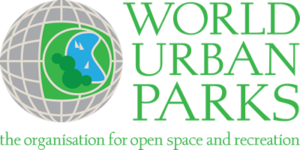
World Urban Parks (WUP) and ICLEI – Local Governments for Sustainability, through its Cities Biodiversity Center (CBC), are thrilled to announce an exciting partnership. The signing of a collaboration agreement formalizes the strong partnership between World Urban Parks and ICLEI for collaboration on the CitiesWithNature partnership initiative and the WUP campaign. Leveraging the individual and collective strengths of the two organizations, this partnership will establish a joint work programme on establishing sustainable urban areas that mainstream, protect, and enhance nature, and maximize the benefit derived from the ecosystem services and nature-based solutions that nature provides for all people and cities.
“The overall aim of this partnership is to reconnect communities with nature in and around urban areas and use the CitiesWithNature platform to facilitate this aim, for the benefit of all partners of the Partnership Initiative. This partnership brings together two strong global organizations committed to advancing the protection and advancement of nature in urban environments for the health and well-being of all people and our planet,” says Jayne Miller, Chair of World Urban Parks.
ICLEI CBC acts globally on biodiversity and nature on behalf of ICLEI, representing the local and subnational government constituency in the United Nations Convention on Biological Diversity (CBD), and is secretariat of the CitiesWithNature partnership initiative, on behalf of the founding partners: ICLEI, the International Union for the Conservation of Nature (IUCN) and The Nature Conservancy (TNC), and the growing network of supporting partners.
World Urban Parks serves as the global voice for urban parks, nature and nature-based solutions providing advocacy, best practices, and bench-marking through global collaboration to resolve issues and increase knowledge and capacity for urban park professionals around the globe.
“We welcome World Urban Parks as a partner on CitiesWithNature. Urban parks and green open spaces provide opportunities for urban communities to enjoy and connect with nature, improving health and well-being. While we cannot all access our parks right now, we know that nature never closes and its multiple gifts continue to benefit our cities. Together we stand in solidarity with our cities to celebrate the value of nature and our urban parks, as we build resilient CitiesWithNature,” said Kobie Brand, Global Director: ICLEI CBC.
Both organizations look forward to working together to advance our joint vision for greener, healthier CitiesWithNature.
Contacts:
WUP Secretariat Coordinator
1-780-644-6976
ICLEI Cities Biodiversity Center
CitiesWithNature
www.citieswithnature.org
This webinar brought together speakers from cities and city networks around the world, sharing thoughts, ideas, and experiences on the role that nature (and specifically urban parks) is playing in urban life at this current moment, in light of COVID-19.
We explored the increased appreciation of parks and nature at this time, indicating what the role of nature will be in the future of our cities. We heard from a diverse range of perspectives, acknowledging that the situation is contextual and different in each part of the world.
The webinar also discussed and compared experiences, approaches, and responses from a variety of contexts and provided a space for reflection and discussion.
Moderator:
Timothy Blatch (ICLEI)
Speakers:
Peter Massini (Greater London Authority)
Mas Dojiri (City of Los Angeles)
Joëlle Roy LeFrançois (Ville de Montreal)
Errol Douwes (City of Durban)
David Callow (City of Melbourne)
Jayne Miller (Chair, WUP)
by Martha Rojas Urrego
This year, the parties to the UN Convention on Biological Diversity will adopt an ambitious global biodiversity roadmap to guide progress toward a future in which humans genuinely live in harmony with nature. To achieve that goal, conservation and restoration of the world’s declining wetlands is essential.
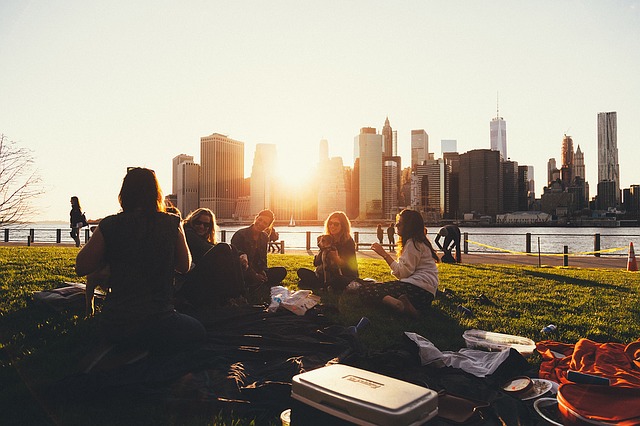
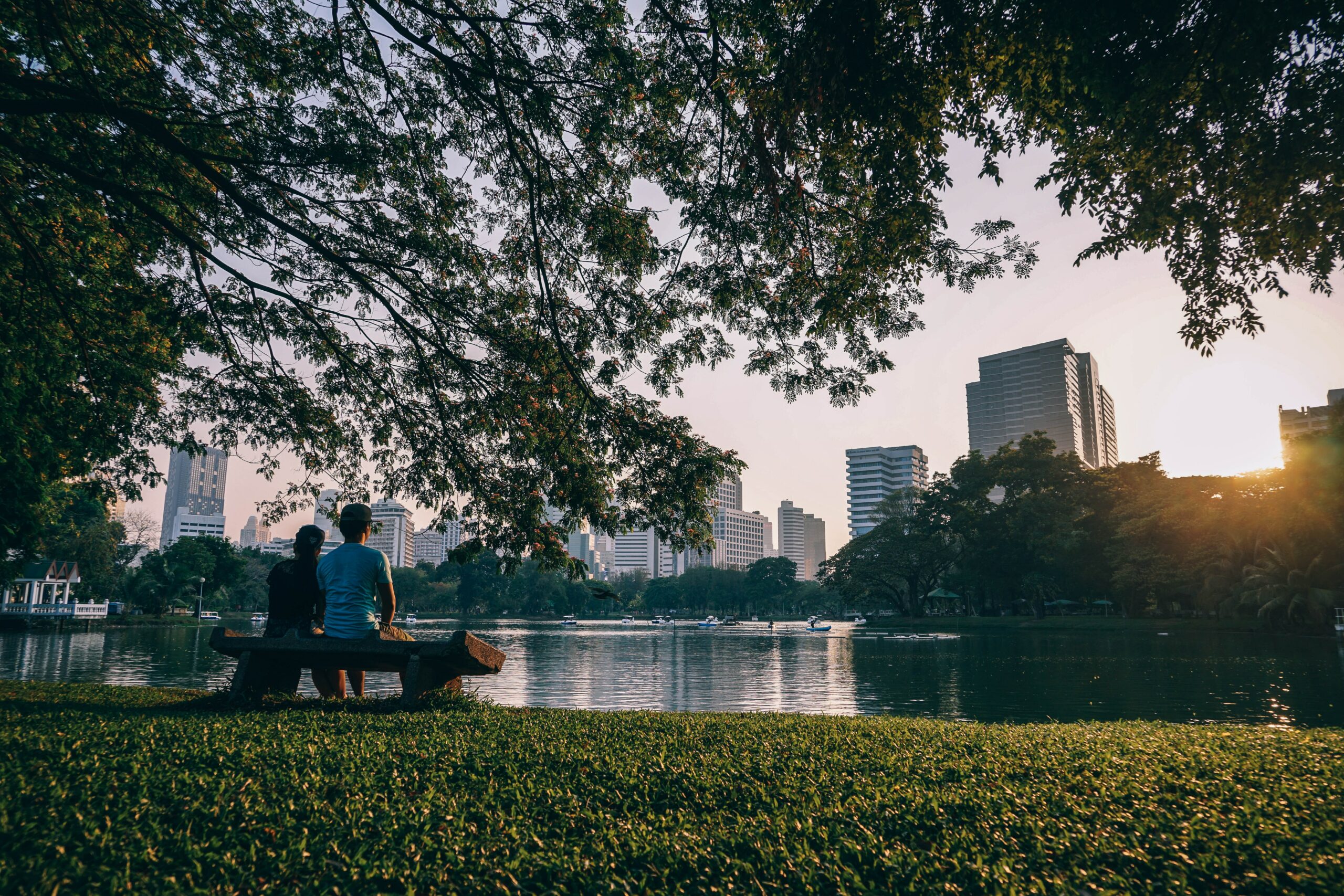
We now face a sixth mass extinction, in which an estimated one million species are predicted to disappear. Does it matter? We survived the dodo’s demise and, though tragic, will the imminent extinction of the northern rhino really affect our lives?
In fact, it will. All living things on our planet depend on healthy and diverse ecosystems for air, water, and nutritious food. These same ecosystems regulate the climate and provide the raw materials and resources on which our economies – and lives – depend. The annual global value of natural services each year is estimated to be $125 trillion.
Yet, biodiversity loss and ecosystem collapse are among the biggest risks to economic prosperity and global development, according to the World Economic Forum. For many, it is a matter of life or death. For all of us, it is an existential threat as far-reaching, complex, and urgent as climate change.
The world’s failure to meet almost all of its biodiversity goals highlights how we’ve underestimated that threat. Humanity wonders at the natural world but fails to value it. We pollute ecosystems, exploit their resources with abandon, and make them inhospitable. Too often, we fixate on the threatened extinction of iconic species – the polar bears and koalas whose suffering makes headlines – while ignoring the vast range of organisms we may never see, but which are essential to sustaining the habitats that support and shelter all life, including us.
The most endangered ecosystems are wetlands, including freshwater rivers, lakes, paddies, marshes and peatlands, and saltwater estuaries, mangroves, coral reefs, seagrass beds, and lagoons. We have lost 87% of our wetlands in the past 300 years, and 35% since 1970. Today, they are disappearing faster than any other ecosystem – three times faster than even forests. As they vanish, so does the life within them. More than 25% of wetland plants and animals – which comprise up to 40% of all the world’s species – are at risk of extinction, and stocks of other remaining species are declining rapidly.
Spending at least 120 minutes a week in natural environments is associated with good health and wellbeing, according to a study published in Scientific Reports.
Mathew White and colleagues surveyed 19,806 adults in England on how much time they had spent over the past week in natural environments, such as fields and woodlands (but not including their own garden), and their self-reported health and wellbeing. They show that people who reported spending 120 minutes or more in nature were more likely to report good health or high levels of wellbeing.
The authors found this association was independent of the size of the available green space in their local neighbourhood. The relationship was also seen in participants of all ages, including those with long-term health issues, which may suggest that the findings were not simply due to healthier people visiting nature more often. It did not matter if the 120 minutes were spent in nature on one occasion or several shorter visits throughout the week, the authors report. Spending under 120 minutes a week in nature was not associated with improved wellbeing, while spending between 200–300 minutes in natural environments showed no additional benefit.
The authors conclude that, although preliminary, the findings represent an important starting point for discussions around providing simple, evidence-based recommendations about the amount of time spent in natural settings that could result in meaningful promotion of health and wellbeing.
Original post here.
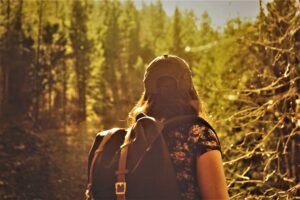
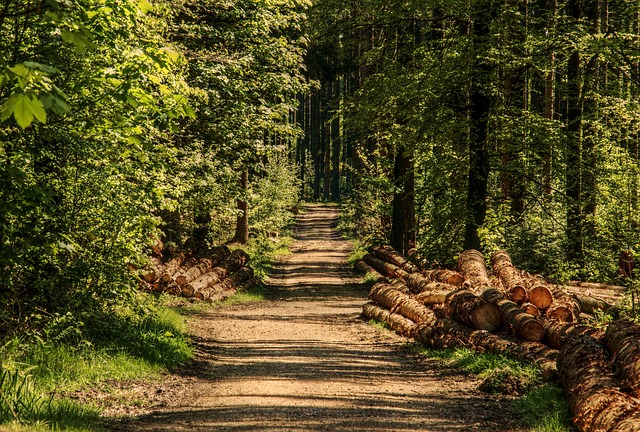
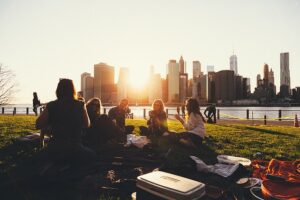
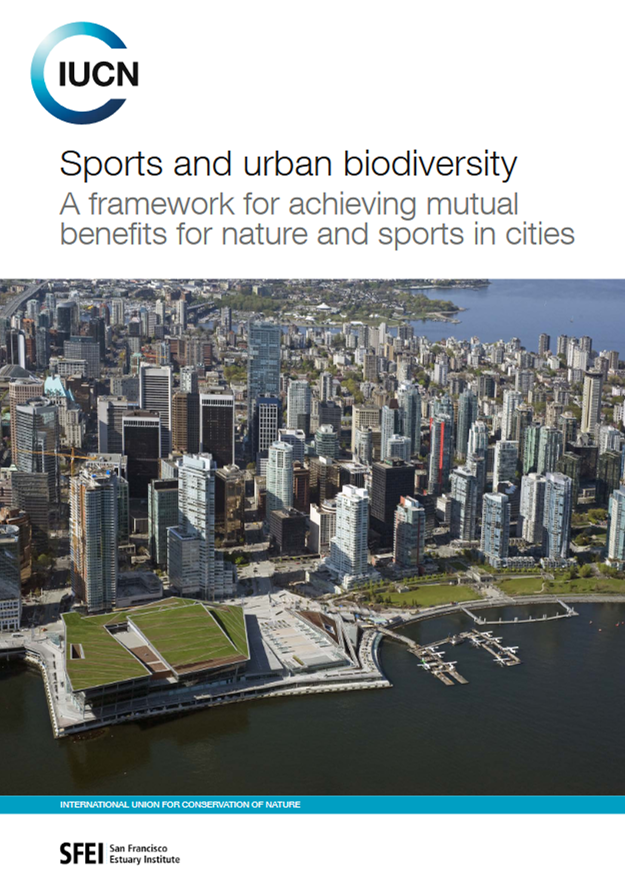
GLAND, SWITZERLAND – It’s called the Extinction Wing. Located in a dark corner of the Paris Museum of Natural History, it houses a haunting collection of species that have long vanished from the natural world. With biodiversity declining faster than at any time in human history, what size museum will future generations need?